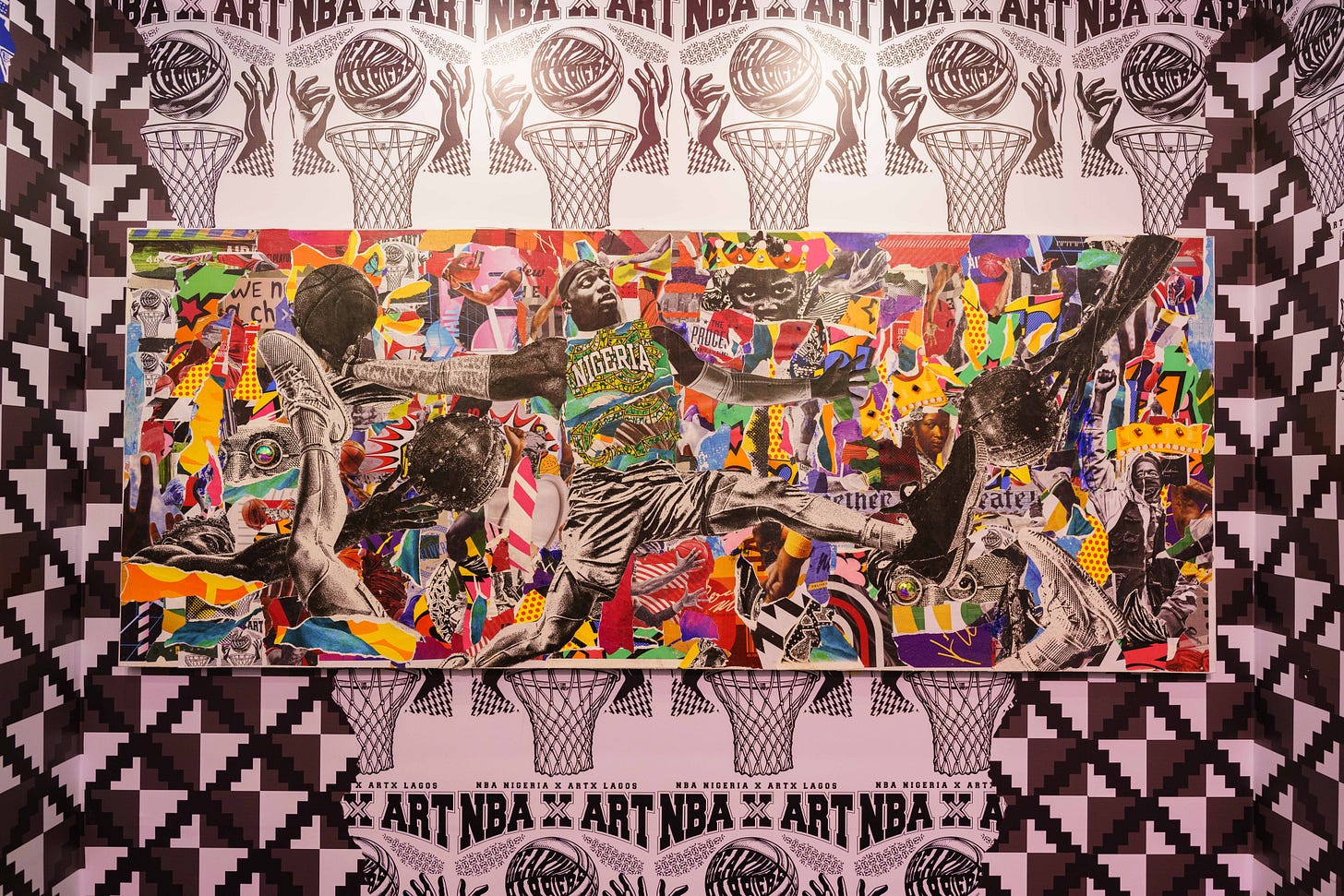Communiqué 46: Creative economy investors are betting big on sports in Africa
The NBA and NFL have spotted massive opportunities for investment in African sports. Local investors have done the same. But what do they see?
1. An opportunity for those looking
An art fair is probably the last place you would expect to have conversations about basketball, but stranger things have happened. This year, at the 10th edition of ART X Lagos, West Africa’s largest art festival, there was an installation dedicated to basketball, featuring a collage of different hands reaching for a ball. Adjacent to it was another art piece created by the festival’s attendees who were invited to create another collage with newspaper and magazine clippings. All of this made up the third edition of NBA Meets Arts, an initiative launched by the African arm of the National Basketball Association in its drive to grow basketball adoption across the continent.
Since its official arrival on the continent in 2010, the NBA has initiated several programs to help grow the sport on the continent, but in recent years the organization has ramped up its activities, another entry in a spate of sports investment on the continent.
In 2019, during the NBA All Star Weekend, Commissioner Adam Silver announced plans to establish the first NBA professional league outside of North America. But those plans did not materialize until 2021, when the first game was played at the BK Arena in Kigali, Rwanda. The following year, the NBA launched the NBA meets Art initiative, and early this year it partnered with ALX Ventures, an African entrepreneurship development program, to launch an accelerator for early stage startups in the sports and creative industries. Festival Coins, creators of the Tix Africa ticketing platform, were the inaugural winners of its demo day.
The NBA isn't the only entity investing in African sports, earlier this year, America’s National Football League expanded its talent identification program to Nigeria, following successful programs in Ghana, Kenya and South Africa. African investors are also in the mix: following Stripe’s acquisition of Paystack, the company’s CEO Shola Akinlade founded Sporting Lagos, a new football team in Nigeria’s commercial capital.
These investments signify growing interest in Africa's sports sector, but what factors drive this interest?

2. The signs are there
Stellar performances by African athletes like Mohammed Salah, Victor Osimhen, and Joel Embiid on the global stage have resulted in a growing interest in watching African sport leagues and tournaments by an international audience. This year’s African Cup Of Nations aired in 180 countries and reached almost 1.4 billion people cumulatively with a unique audience of 22.3 million, a 54% increase from the previous edition. Football is not the only sport experiencing this growth in viewership, South Africa Premier cricket league also witnessed a 35% increase from the previous year. This growth in viewership will enable subsequent tournament editions to secure larger and more profitable commercial partnerships with sponsors and broadcasters. This was the logic that drove Silverback Holdings’ recent investment in African Warriors Fighting Championship (AWFC) Nigeria’s largest promoter of Dambe (traditional boxing). Prior to the investment, AWFC had garnered over 500 million views across various platforms with the majority of viewers outside Nigeria coming from Brazil and the U.S. Silverback Holdings has also invested in the Cape Town Tigers, a team in NBA Africa’s Basketball Africa League.
Despite lucrative multi billion dollar broadcast deals, the NBA and NFL are reaching saturation in the U.S., which is their primary market with declining ratings and viewership. Now these leagues are turning to Africa to cultivate a new fan base. Africa has a young and youthful population and will account for 25% of the world population by 2050, and with increased internet penetration young Africans have become an important demographic for foreign sports leagues. Temitope Lawani, CEO of Helios Fairfax Partners, a private equity firm that invested in NBA Africa at a $1 billion valuation stated this as the reason for the investment.
“Africa is the only place where the population of young people is actually growing. That’s where the people are who might play these sports. More affordable technology has made the continent a much more relevant market for the consumption of content and products,” Lawani told Bloomberg.
Already this focus on promoting basketball on the continent is bearing fruits. Last season, 140 NBA games were broadcast live across the continent, generating a 41% increase in average viewership from the previous year.
3. Building an African talent pipeline
When Joel Embiid won the NBA MVP award for the 2023 - 2024 season, it was validation for years of work the NBA and other affiliate organizations like Giants Of Africa had done in developing African talent. Embiid first played organized basketball at Basketball Without Borders, a training camp organized by the NBA, in his native Cameroon when he was 15 years old. Investors like the NFL and NBA have identified Africa as an important source of talent and are looking to develop that pipeline for their leagues. In the NFL there are over 130 players of African descent, meanwhile in the NBA, a record 17 African players featured in the opening night of the 2024/2025 season, almost triple the number from 2014. NBA Chief Operating Officer Mark Tatum sees this as justification for the association’s continued investment on the continent.
“We’ve got that level of presence of African players or players of African descent playing in our league with no infrastructure. Once we build that infrastructure, and people start investing in that infrastructure to create these pathways, we think that that number is going to continue to grow and grow and grow significantly,” Tatum told the New York Times.
This need to export African talent is also what drove Paystack CEO Shola Akinlade’s acquisition of a 55% stake in Danish second division football club, Aarhus Fremad, to create a pipeline to Europe for his Sporting Lagos players.
4. Looking into the future
While investors have indicated interest in investing in sports on the continent, the infrastructure to carry this investment is limited. For instance, Africa is the only continent not to have hosted a UFC match, with the UFC stating that it requires an arena with a minimum sitting capacity of 12,000, of which there are few in Africa. Improving existing local facilities, such as stadiums, training centers, and community sports complexes, and building new ones would help drive increased investment in sports and also create a suitable environment for athletes to train up to international standards. Rwanda and Senegal have taken the lead in this space with the development of the 10,000 capacity BK Arena in Kigali and the 15,000 capacity Dakar Arena in Diamniadio. However, construction has begun on a 12,000 capacity arena in Lagos by a consortium of investors including the Persianas Group, Live Nation, the Nigerian Sovereign Investment Authority, and the Lagos State Government.
Also, physical infrastructure improvements in transportation, hospitality, and multi-purpose venues and the ease in visa restrictions across the continent open new possibilities for sports tourism.
This surge in sports investment across Africa highlights a significant transition from the view that sports is mere recreation to recognizing its potential as a business. Major investors like the NBA and NFL are not only cultivating fan bases but are also building the infrastructure needed to sustain this growth. More African investors need to tap into this.




